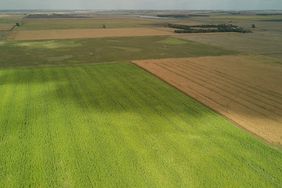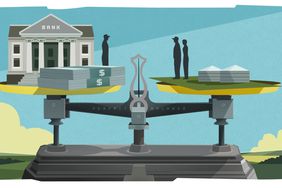:max_bytes(150000):strip_icc()/VBaleha-4701866035B15D-2000-f141a8c45e324db4ae647ccb8df339ca.jpg)
Farmers who are experiencing tough financial times, need an alternative for loan assistance, and have been turned away by their regular bankers should know that there's help out there in 2020.
There's plenty of evidence that farmers across the U.S. are suffering from multiple years of low commodity prices. Net farm income has been practically cut in half from its peak in 2012.
From September 2018 to September 2019, U.S. Chapter 12 farm bankruptcies jumped 24%. In the Midwest alone, farm bankruptcies (255 filings) climbed 13% year over year, according to the U.S. Courts data.
Servicing Debt
Paul Erickson, president/CEO of Conterra Ag Capital, runs an operation that serves as a loan service provider and loan originator. They originate loans +/-$400 million annually for different investment funds.
While working for Farm Credit, Erickson watched loans come in and present more risk than Farm Credit tolerated, thus, the loans were denied.
"I always thought there had to be a better way to underwrite loans and assess the risk in loans," Erickson says.
As a result, Conterra Ag Capital, the company Erickson founded in 2014, has creatively brought to agriculture capital from a variety of sources. Conterra has tapped insurance companies, Farmer Mac, and three company created funds that use institutional equity (hedge funds, university endowments, and family office) to invest in real estate-secured loans that have had stress.
Even with equity, these loans showing stress would be considered a criticized asset on a bank's balance sheet, often causing the bank to work to get the loan off its balance sheet. "So, we will work to restructure those loans. We'll take short-term amortizing debt, roll it onto the real estate, do two years of interest only, and rehab that borrower's situation," Erickson says.
To be sure, banks and individual borrowers contact Conterra directly for assistance.
Conterra has risk managers all across the country. And it has had a lot of success with this program.
Erickson sees no shortage of capital that wants to come into the agricultural loan sector.
In general, Conterra provides real estate financing to producers and agribusinesses at very attractive rates with short or long maturities. Conterra's transitional lending program handles loans that need to be restructured with interest-only rates between 7.5% and 9.0%.
"Because most of our alternative-type loans are interest only, it's like a 5% amortizing debt, from a cashflow standpoint," Erickson says.
It's worth pointing out that one of the main issues in agriculture is not equity, but liquidity, due to a drop in commodity prices and working capital.
"So as a result, with every loan that we do, the net effect is we are lowering their debt services requirements, even though the interest rate is higher. We are willing to take the risk of an interest-only loan, rely on the borrower's equity and collateral, and take it on for two to three years," Erickson says.
Erickson added, "We have many examples of borrowers taking a loan for two years and after the first year things have looked good enough that we will refinance them back into our traditional lending programs at market rates. Often at a sub-4% or 5% rate."
READ MORE: 20 Strategies That Farmers Can Use In 2020
2020 Strategies
Erickson is telling his farmer-customers that there are five steps they can take in 2020 to become a more qualified candidate for traditional loans.
Lock-in Real Estate Debt:
For the past few years, the right move has been to have your loans on short-term rates, he says. But, right now, long-term interest rates are really cheap.
"Who knows what's going to happen six months from now. I'm a big advocate of having producers lock a portion of their real estate debt into something longer than three years. We can go all the way out to a 30-year fixed loan. You can lock in a 15-year fixed below 4%. If you get caught in a quick upswing of interest rates, that will be painful," Erickson says.
Know Cost Per Acre:
Producers need to know cost per acre, which includes equipment and debt costs, he says. "And, they have to try to drive down that cost per acre. Rents have been renegotiated, but more attention is needed on the expense per acre. Based on our data, you would be amazed at just how much expense per acre some of these struggling farmers are carrying vs. the successful farmers," Erickson says.
Grain Marketing:
Many of the Conterra Ag Capital farmer-customers can make money on $4.00-per-bushel corn prices, he says.
"The futures market reached $4.70 this year, and however farmers can do it; hedge, cash-forward sales, etc., they need to be on top of their marketing plans. There will be opportunities in 2020. Hopefully, soybean prices pop, and staying on top of the marketing is as important as anything," Erickson says.
Know Your Financials:
One of the biggest issues that Erickson deals with, regarding farmers looking for financial assistance, is poor financial records.
"Coming into our office with a shoebox full of receipts and tax returns that doesn't cut it," Erickson says.
He added, "If we had two like borrowers side-by-side, in terms of their profitability, and one had well-constructed financial statements, they knew their numbers and the other candidate didn't, I'd take the first one every time."
Erickson advises farmers to work with an accounting firm, and produce a year-end balance sheet.
"Look at your projections and cash flows. As a business owner, myself, I don't know how people operate without those documents. So, this helps when you do get into financial trouble to know what levers you can pull to help out your situation. Waiting around for higher prices is not a good financial plan," he says.
Add Value To Crops
In some part of their business, if farmers can diversify in some way, it helps weather this type of price downturn better than just growing corn and soybeans.
"We've seen customers who are growing just corn and soybeans, and their only way out of financial trouble is to sell some real estate. It's so important for farmers to think about things. Don't fly by the seat of your pants," Erickson says.








